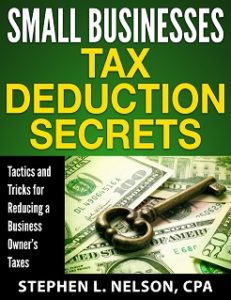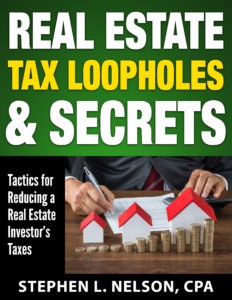
If you’re a new business owner in Washington State, the gross receipts tax (also known as “Business & Occupation tax” or “B&O tax”) you pay can seem a little tricky to understand. So for people new to business ownership, I want to provide a really quick overview of the basics.
Are You Subject to Washington B&O?
You are subject to B&O if you operate a business in Washington State. You pay the tax for the privilege of doing business in Washington State.
And a follow-up point, the state learns about your operating a business because you apply for a master business license with the state’s Department of Revenue. In fact, the master business license process should perhaps be retitled “sign up to pay business and occupation taxes”.
How Does the B&O Tax Work?
The Washington state business & occupation tax works really simply. And that’s an advantage that is often ignored.
Mechnically, you simply pay a percentage of your gross receipts. Commonly, the percentage runs about .5%, or half a percent. But service businesses pay a 1.5% rate. And some businesses pay lower rates. (Click here to see the Department of Revenue’s current list of business and occupation tax rates.)
Example: If you operate a small professional services firm (say a consultancy) and the firm grosses $200,000 in revenue, you will owe 1.5%, or $3,000, in business and occupation taxes.
If you run a $1,000,000 manufacturing or wholesaling firm, you will owe .484%, or $4840, in business and occupation taxes.
Are There Deductions for B&O Tax?
You pretty much pay B&O on all your net in-state revenue. So that means you only get to deduct returns, “never collected” money and out of state sales.
Example: If you run a business that generates $1,000,000 in revenue but $200,000 of this revenue gets earned in California and $100,000 gets earned in Oregon, Washington state can probably only tax you on the net $700,000 of Washington state revenue.
Example: If you have to return $50,000 of your Washington state revenue due to a customer dispute and you end up not collecting another $25,000 of your Washington state revenue because a customer simply can’t pay, you will end up paying taxes only on about $625,000 of Washington state revenue.
 Tip: Remember that Federal tax laws do provide small businesses with dozens of useful small business tax deductions.
Tip: Remember that Federal tax laws do provide small businesses with dozens of useful small business tax deductions.
If you want more information about how to take advantage of these tax saving gems, consider our popular downloadable ebook “Small Businesses Tax Deduction Secrets“.
Also note this: If you’re a client of our CPA firm, you shouldn’t purchase any of our e-books. Just call us and ask for your complimentary copy.
But note that (surprisingly) you can also pay B&O on things that aren’t really revenue. For example, in some cases, if you’re a partner in a business, though the partnership pays B&O on its revenue (because the partnership is running a business), if you receive part of your income in the form of a guaranteed payment from partnership, you may also need to pay B&O taxes on that.
Another example: Until October 1, 2013, a common paymaster arrangement in the state’s eyes created “fake” revenue the state thought it should be able to tax. (For more information about this recent rule change, refer here.)
Are There Credits for B&O Tax?
If you’ve got a service business doing less than about $56,000 in annual revenues or a manufacturing or retail business doing less than about $170,000, you can take a small business B&O tax credit to eliminate the B&O tax.
If you’re running a service business that does between (roughly) $56,000 and $112,000 in annual revenues or a manufacturing, wholesaling or retailing business that does between (roughly $170,000 and $340,000), you get a small credit that will wipe out part of the B&O tax you pay.
Does Rental Income Get Taxed?
While real estate investors commonly think about their rental property investments as a business, one thing to know is rental income is generally not subject to Washington state business & occupation tax.
This exclusion applies to rental arrangements where a landlord rents to a tenant for 30 days or longer.
By the way, this means you are liable for B&O taxes on a nightly or weekly rental–such as a hotel or weekly vacation rental. (This would obviously include something like an AirBnB business.)
Also, since we’re on the subject, you should that a handful of other requirements need to met, too. The tenant must get exclusive use of the property, have the exclusion right to continuous possession, and the truly have control over the space.
 Tip: Real estate investments provide some Washington state investors with a powerful way to minimize federal income taxes.
Tip: Real estate investments provide some Washington state investors with a powerful way to minimize federal income taxes.
We’ve got lots of resource available for these investors at the blog here.
And we’ve also got a downloadable reference many new real estate investors will find invaluable, our $40 “Real Estate Tax Loopholes and Secrets” e-book.
When Do I File a Washington State Business & Occupation Taxes Return?
The deadlines for filing a B&O tax return vary depending on the size of your business.
For starters, if you’re not collecting sales tax and your revenues fall under a specified threshold ($28,000 for most businesses) you don’t need to file a B&O tax return at all.
If you exceed this threshold, you file either monthly, quarterly or annually. Specifically, if you’ll owe more than $4800, the state wants monthly returns (due by the 25th of the next month). If you’ll owe less than $1050, you owe an annual return (due by the 31st of January). Everyone else needs to file quarterly B&O tax returns (due by the last day of the month following the quarter’s end).
One other quick note: If you owe a monthly B&O tax return, you are required to file your return electronically.
This was a helpful article, my business just received a resellers permit and it was classified as manufacturing and I didn’t understand what that meant in regards to taxes. My question is you wrote if your business is small and does less that 28,000 you don’t need to do taxes but when I talked to someone at Washington dept. of revenue today they said even if your selling on eBay and make 1,000 a year you have to file. Can you provide more info for me about this? Thank you!
You should file the returns you owe the state and the IRS… even if only to show them you don’t owe any tax.
BTW, one way to look at this filing requirement if one is just ramping up is as a low-risk way to learn how this stuff works. As yout business grows, doing the tax returns right will be more and more important. Best, therefore, to learn the lay of the land when the stakes are low.
Good luck!
Am I missing something or in the post and in the answer to Allison’s question there are two contradicting statements:
1) “For starters, if you’re not collecting sales tax and your revenues fall under a specified threshold ($28,000 for most businesses) you don’t need to file a B&O tax return at all”
2) “You should file the returns you owe the state and the IRS… even if only to show them you don’t owe any tax”
Your clarification will be very much appreciated!
Good question, Ted. Here’s how I’d reconcile the statements… you don’t have to file a tax return (in general) if you don’t tax…. but probably should in many cases just to explicitly go on record as saying you don’t owe tax.
BTW, one general (big) issue here is that by filing a tax return that says you owe no tax, you often start the timeclock running on the statute of limitations. But if you don’to file a tax return (because you don’t owe tax), the statute of limitations never starts ticking…
I’m a freelance designer based in the Seattle area. I am working on a long-term project for a firm in Europe. It will be the only thing I’m working on for the next year or so. They will be paying me via PayPal. Is this income subject to the Washing state B&O tax? In other words, am I doing business in Washington?
Thx for your help!
Possibly not… but if you’re not paying Washington state, you should logically then be paying Germany or France or whatever country you’re working the business taxes they want.
I.e., you can’t tell Germany you don’t owe them tax because you’re operating in Washington and then simultaneously tell Washington you don’t owe them tax because you’re operating in Germany.
Jumping on this – can you say what “Operating” means and how this applies to B&O? I have a WA business license for my pass-through LLC and I am subcontracted by a UK firm to do IT work for them – sometimes working from home in Washington and sometimes located in Europe. I invoice them monthly with no sales tax added since they are foreign entity. Would all or part of these revenue be subject to B&O if either situation is deemed to be operating here?
I think all the work you do in Washington state is subject to B&O.
I think if you’re doing work in the UK (and then paying taxes there) on other chunks of the work, that non-Washington-state income is not subject to Washington B&O.
My husband and I own a contractor business,. We file quarterly and pay quarterly. Doesn’t b&o taxes get paid every quarter? Or do we owe at the end of the year
How often you file your B&O return depends on how much you owe. I.e., people file and pay monthly or quarterly or annually depending on the size of the business.
Hi there, thanks for your helpful article. I’ve been running a small online only record (vinyl) store for the past 6 years and recently discovered I should apply (and did) for a business license in Washington. I’ve been paying quarterly taxes to the IRS using the 1040-ES form this whole time but now I’m worried I’m going to have to pay even more now that I’m filing a state return as well. Is the gross income I need to submit on the online e-file return form only the income from WA state buyers or just gross income in general I’ve received from all the buyers across the US? Also, would this income be filed under the “retailing” portion? Any help would be appreciated.
You probably don’t owe the B&O tax if your sales revenue has been really modest. There’s a threshold you have to cross.
You would be able to exclude out of state sales from sales tax and state B&O taxes… so you may not have as much of a problem as you think.
My general advice to people in a situation like yours is to first start complying with the law so any problem doesn’t get worse… and then to later look at going back and seeing whether you have issues with past years. Often, dealing with past years’ returns is not as bad as you think.
Is my Seattle based medical massage business subject to B&O taxes?
Yes. Absolutely. And remember you’re subject both to state and city B&O.
How does it work if your business model provides both services and retail?
The 1.5% D&O tax on revenue seems quite high when typical net income/revenue are on the order of 5-10% typically, so it can be 15-30% of net. I am considering relocating the headquarters of my small professional LLC to Washington. We’d be moving up about a million in compensation but don’t have any of our revenue from Washington state clients. Our revenue comes from NW, IL, CA, PA and many other states, and some have some withholding but many do not (we operate in CA). Do we only pay D&O on the revenue that is actually received from Washington clients? Is B&O paid only on WA revenue, or is it paid on any revenue that isn’t taxed elsewhere?
I think the way it’ll work based on the info you provide is you will pay B&O on anything you don’t source to another state.
Hello. I am super confused 🙂 I have been running a small photography business and paying B&O tax for 5 years. I don’t make much about $10,000 a year but always seem to pay what seems like a ton in B&O around $600 each year! Since I make under a certain amount do I even need to file? Or do I just put $10,000 into the little calculator and pay the horrendous amount of $600ish?!
B&O runs from half a percent to a percent and a half of your revenue. So even if you don’t make much profit–if you’ve got enough revenue–you can still pay significant taxes.
Tip: You should make sure you’re filing online (and not by paper) so that any small business B&O credit you’re entitled to gets figured in…